| Srl | Item |
| 1 |
ID:
187730
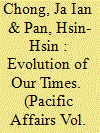

|
|
|
|
|
| Summary/Abstract |
Two trends have become increasingly apparent from public opinion polls in Taiwan and Hong Kong over the past decade. One is a growing identification with and confidence in being exclusively Taiwanese or Hong Konger. The other is increasing public support for democracy. Existing research investigates the association between local identity and democracy, but does not address the meanings people in Taiwan and Hong Kong ascribe to their identities. This limits a fuller understanding of the relationships and driving forces between and behind these trends. One interpretation is that demands for greater democracy mask growing nativism, even xenophobia. An alternative one is that heightened local identification reflects aspirations for greater political participation and restraint on executive authority in Taiwan and Hong Kong. Using discourse analysis collected through the Making Identities Count in Asia project, alongside polling data, we submit that elite and mass discourse reveal an integration of democratic expectations with local identity and its broadening appeal in Taiwan and Hong Kong. People in these two societies take principles associated with democracy to be closely tied to their sense of identification and locality. Such ideas do not eschew the value of tradition rooted in local experiences and can outweigh economic growth. However, Hong Kongers and Taiwanese have come to identify substantively more with democracy than the exceptionalism implied in “localism,” “Asian values,” or some form of nativism. PRC attempts to appeal to local concerns in Taiwan and Hong Kong need to grapple with either meaningful respect for democratic aspirations or effectively repressing them. PRC insistence on the erasure of such values will likely result in continued tensions with Taiwan and Hong Kong, and include mass resistance and the need for force, even violence.
|
|
|
|
|
|
|
|
|
|
|
|
|
|
|
|
| 2 |
ID:
101279
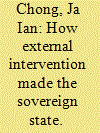

|
|
|
|
|
| Publication |
2010.
|
| Summary/Abstract |
From post-World War II decolonization to establishing order in war-torn polities today, external intervention can play an important role in fostering sovereign statehood in weak states. Much attention in this regard emphasizes local reactions to outside pressures. This article augments these perspectives by drawing attention to ways that foreign actors may affect the development of sovereignty through their efforts to work with various domestic groups. Structured comparisons of China and Indonesia during the early to mid-twentieth century suggest that active external intercession into domestic politics can collectively help to shape when and how sovereignty develops. As these are least likely cases for intervention to affect sovereign state making, the importance of foreign actors indicates a need to reconceptualize the effects of outside influences on sovereignty creation more broadly.
|
|
|
|
|
|
|
|
|
|
|
|
|
|
|
|
| 3 |
ID:
187727
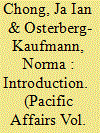

|
|
|
|
|
| Summary/Abstract |
A growing global trend towards authoritarianism has left democracy, especially its liberal form, under strain. This has occurred despite earlier promises of democratization between the end of the Cold War and the early twenty-first century. Our essay examines how the dynamics of post-democratization politics have played out across several polities in Southeast and Northeast Asia. These regions once included supposed “third wave” democracies and polities apparently on the cusp of political liberalization. Such expectations have not panned out. Instead, the region has generally witnessed either significant authoritarian resilience or autocratic resurgence following spurts of political openness. We examine how such autocratic dynamics have played out following earlier movements toward democratization. Specifically, we identify three key elements of post-democratization politics associated with autocratic success and democratic robustness based on contributions to this special issue, and suggest pathways through which they can affect political outcomes.
|
|
|
|
|
|
|
|
|
|
|
|
|
|
|
|
| 4 |
ID:
134086
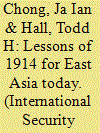

|
|
|
|
|
| Publication |
2014.
|
| Summary/Abstract |
The importance of World War I for understanding contemporary East Asia lies not in the ubiquitous analogy drawn between Anglo-German antagonism and contemporary U.S.-China relations, but rather in the more specific lessons the period preceding its outbreak offers concerning the sources of instability and conflict among states. More precisely, these lessons relate to the challenges posed by complex security arrangements, the dual-edged nature of nationalism, and the dangerous dynamics that can emerge during repeated crises. Appreciating how these factors contributed to mounting tensions and eventually the onset of war in Europe a century ago can enhance efforts to understand and manage tensions in East Asia today.
|
|
|
|
|
|
|
|
|
|
|
|
|
|
|
|
| 5 |
ID:
152471


|
|
|
|
|
| Summary/Abstract |
Both the East and Southeast China Seas have been home to a series of repeated episodes of tension between the People’s Republic of China (PRC) and its neighbors. Much of the existing literature either treats such episodes as isolated data points or as the manifestation of underlying structural factors. In this paper, we argue that repeated tensions can have important effects on subsequent interactions, generating emergent dynamics with dangerous consequences. What is more, we believe those dynamics to already be in play in several of the disputes within East Asia today. Examining recent developments in PRC-Japan and PRC-Philippines relations, we seek to shed light on how iterated episodes of tension are shaping the trajectory of interactions in both dyads. We believe these insights can inform efforts to understand relations in the region and beyond, given the growing frequency and intensity of repeated tensions among actors.
|
|
|
|
|
|
|
|
|
|
|
|
|
|
|
|
| 6 |
ID:
133176
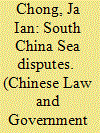

|
|
|
|
|
| Publication |
2014.
|
| Summary/Abstract |
An introduction is presented in which the editor discusses various reports within the issue on various topics related to the dispute over the South China Sea including the causes, the relationship between China and the Philippines, and the role of nonclaimants in the disputes.
|
|
|
|
|
|
|
|
|
|
|
|
|
|
|
|